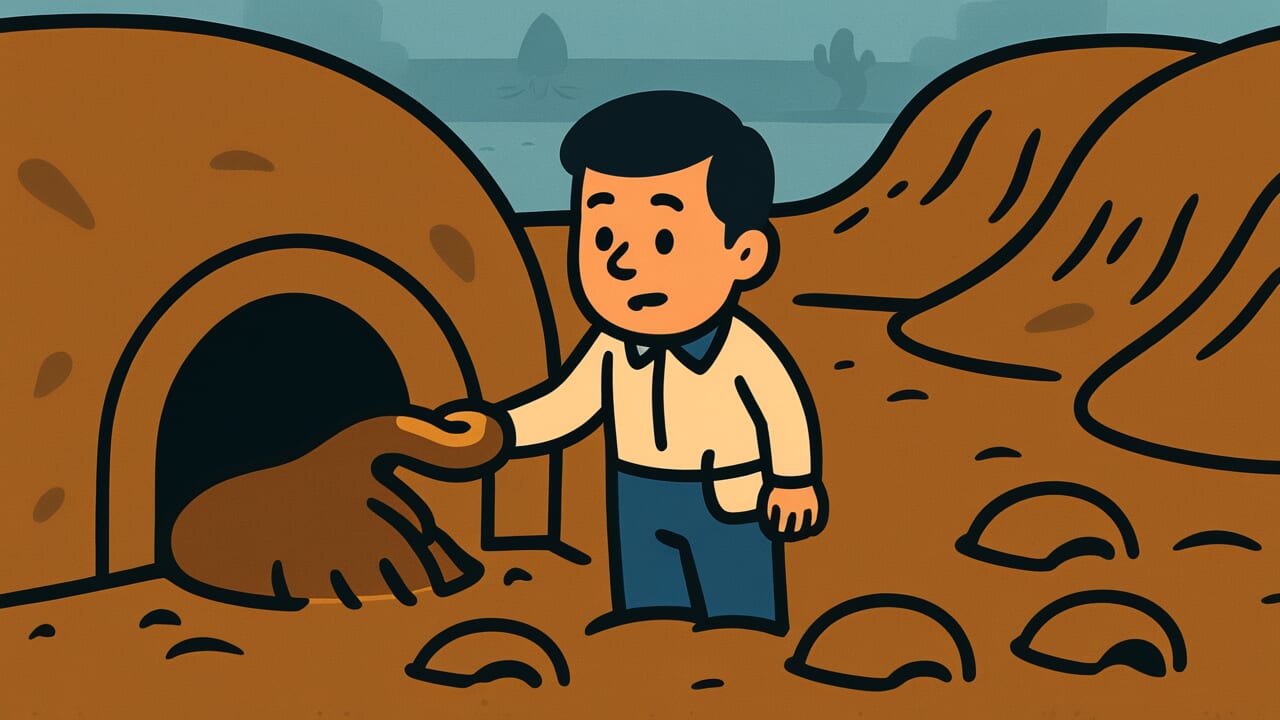How to Read “Pricing the badger in the hole”
a-na no mu-ji-na wo ne-dan su-ru
Meaning of “Pricing the badger in the hole”
“Pricing the badger in the hole” is a proverb that warns against the foolishness of treating something you haven’t obtained yet as if you already have it.
It describes the overly hasty action of deciding the selling price of a badger that might be in a hole before you’ve even caught it.
This proverb is used when someone treats uncertain things as if they were certain and makes plans or builds expectations based on that assumption.
It applies to situations like proceeding with discussions that assume success before results are in, or planning to spend a budget on a project that hasn’t been approved yet.
Even today, it’s understood as a warning against baseless optimism and premature planning.
In our modern world where risk management is highly valued, it serves as a lesson showing the dangers of underestimating uncertainty.
The practical wisdom embedded here is that placing excessive expectations on uncertain things ultimately leads to disappointment and loss.
Origin and Etymology
No clear written records of this proverb’s origin seem to exist, but the structure of the phrase reveals an interesting background.
Let’s focus on the expression “badger in the hole.” Badgers and tanuki are animals that dig holes to live in.
During the Edo period, their fur was prized for cold-weather clothing, and their meat was also eaten. They had economic value as hunting targets.
However, catching a badger in a hole was not easy. Even if you found a hole, you couldn’t be sure if a badger was really inside.
And even if one was there, you couldn’t know for certain whether you could catch it without it escaping. Yet to “price” it means to estimate its selling price, which is far too hasty.
The background of this expression likely reflects the lived experiences of people at that time.
In hunting and business situations, they probably warned people who failed by placing expectations on uncertain things by comparing them to the familiar scene of badger hunting.
While similar in concept to “counting your chickens before they hatch,” this proverb has a distinctive feature. By emphasizing the “inside the hole” aspect, it highlights the invisibility and uncertainty even more strongly.
It’s an expression that condenses the wisdom of common people.
Usage Examples
- Let’s not make plans like pricing the badger in the hole when we haven’t even secured the contract yet
- It’s too early to look for a new apartment like pricing the badger in the hole when the acceptance results haven’t even been announced
Universal Wisdom
The proverb “Pricing the badger in the hole” speaks to a fundamental human psychology: our tendency toward “wishful thinking.”
Why do people treat things they haven’t obtained yet as if they already possess them?
It’s because humans are creatures who hold hope for the future. We try to gain mental stability by imagining positive outcomes for an uncertain future.
This psychology itself is not necessarily bad. Without hope, people couldn’t take on challenges.
However, when the distinction between hope and reality becomes blurred, people make serious mistakes.
They decide the price of a badger that might not even be in the hole. At that moment, something uncertain transforms into something certain in their minds.
This proverb has been passed down for hundreds of years because this human trait remains unchanged across time.
Ancient people and modern people alike waver between expectations for the future and reality.
Our ancestors saw through this universal human weakness through the familiar scene of badger hunting.
And they continue to teach us the difference between having hope and drowning in hope.
When AI Hears This
The expression “Pricing the badger in the hole” is a linguistic “chimera” born from fragments of multiple real proverbs colliding in the brain.
Analyzing the generation process of this misuse reveals interesting characteristics of the human memory system.
First, looking at phonetic similarity, the combination of “hole” and “badger” comes from “badgers from the same hole.”
Meanwhile, the verbalization of “pricing” likely derives from semantic association with “counting the hide,” meaning the concept of “calculating the value of something not yet obtained.”
In linguistics, this type of confusion is called “semantic field interference.” In other words, multiple expressions with common tags like “animal,” “calculation,” and “expectation” are stored close together in the brain.
So when retrieving them, the parts get mixed up.
What’s even more interesting is the creation of the non-standard verb “to price.” Where one should properly say “to put a price on,” the brain tried to compress it into one word for efficiency.
This is evidence of the linguistic economy principle at work.
Tracing the propagation of such misuses reveals that human linguistic memory functions as a network of meanings.
Memory retrieval is not a perfect copy but a “reconstruction” each time. Misuse is not merely a mistake but a creative byproduct of the language system.
Lessons for Today
What this proverb teaches you today is the wisdom to distinguish between hope and planning.
Having dreams is wonderful, but acting on the assumption that unrealized dreams are already real is dangerous.
In modern society, this lesson has become even more important. Seeing only success stories on social media, you might believe you can easily succeed too.
Getting involved in investment schemes and planning to spend profits you haven’t earned yet. Making expensive purchases before your job is confirmed.
These situations are exactly like “pricing the badger in the hole.”
What matters is taking things step by step. First find the hole, then confirm a badger is inside, then capture it, and only then set a price.
Clear each step reliably before moving to the next. This carefulness ultimately protects you.
Holding hope while facing reality. This balance is the way of life our ancestors wanted to convey to us.
Don’t rush. Move forward steadily, one step at a time.



Comments